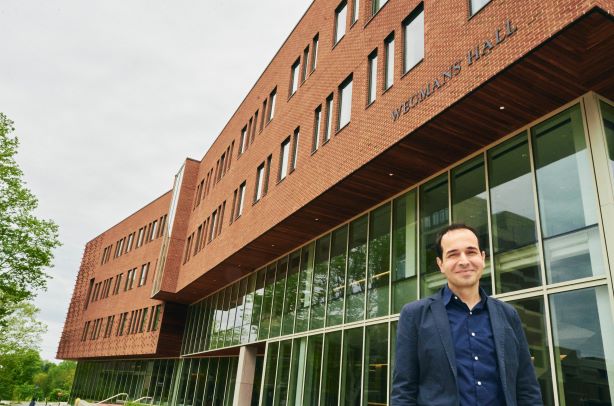Institute News
GIDS’ new interim director wants to ‘build a community’ with faculty
June 28, 2019

Mujdat Cetin would like University of Rochester researchers to see the Goergen Institute for Data Science (GIDS) as an equally important “dimension of their professional identities.” That will be one of Cetin’s top priorities when the associate professor of electrical and computer engineering takes over July 1 as GIDS’ interim director for a one year term.
Academic researchers tend to identify themselves with their research groups, the courses they teach, the grants they receive, the departments they are connected to.
Mujdat Cetin would like University of Rochester researchers to see the Goergen Institute for Data Science (GIDS) as an equally important “dimension of their professional identities.”
That will be one of Cetin’s top priorities when the associate professor of electrical and computer engineering takes over July 1 as GIDS’ interim director for a one year term. He replaces Ehsan Hoque, assistant professor of computer science, who held the position for a year and a half while the University conducted a nationwide search for a permanent director to replace Henry Kautz. That search will continue this fall. Kautz, the founding director of GIDS, is currently serving a three-year term as director of the Division of Information and Intelligent Systems at the National Science Foundation.
The Institute, founded in 2014, “has put the University of Rochester way ahead of the curve as compared to some of our peers,” Cetin says. “It is a very well-managed, well-established organization; it has very successful academic programs, at both the undergraduate and graduate level.” (Read more here about data science at the University of Rochester.)
What’s needed now are ways to better connect the institute with the University’s “diverse set of faculty, in areas from basic sciences and engineering, to medicine and economics, who obviously have different research interests, but have a shared interest in the theory, techniques, and applications of data science,” Cetin says.
Many of the faculty members he’s talked with, he says, want to know “how GIDS can contribute to the scientific environment and scientific output that we have; and how it can help us do something that we ourselves are not already doing.”
So, as he makes the rounds this summer and into fall, Cetin will be gathering ideas on how to build a community that more closely engages faculty with GIDS. “We should come up with activities that not only improve faculty connections with the institute, but improve our knowledge of one another’s research,” he says.
In parallel, he wants to explore incentives and mechanisms GIDS might offer to encourage multidisciplinary collaborations among faculty. That might involve GIDS facilitating the formation of research clusters, and helping researchers write research proposals, with the goal of “coming up with multi-PI, major research initiatives in data science that we wouldn’t be doing in our own departments,” Cetin says.
He’s also interested in exploring synergies between GIDS and the University’s Rochester Data Science Consortium, which was established in 2017 with New York State funding to help create “high-value, knowledge-based” jobs in Rochester and further the region’s development as a high-tech hub. Consortium staff do this primarily by working hand in hand with companies to address their data science challenges. Cetin is interested in creating opportunities for faculty to have closer interactions with the consortium, through their students or perhaps by serving as consultants for industry data science projects.
And Cetin wants to be sure GIDS is “publicized well to the outside world,” including industry, other academic institutions, government, and foundations. “We want to make sure GIDS is seen as one of the prominent data science institutes in the nation and globally,” Cetin says.
All in all, an ambitious agenda for an interim director.
“But one year is a reasonable amount of time,” Cetin says. “It certainly should not be wasted; it should be used well.”
Cetin joined the University in 2017 after serving as a faculty member at Sabanci University in Istanbul, Turkey for 12 years. At Sabanci he directed the Signal Processing and Information Systems Laboratory. From 2001 to 2005, he was with the Laboratory for Information and Decision Systems, MIT. Cetin has held visiting faculty positions at MIT, Northeastern University, and Boston University.
His research interests are within the broad area of data, signal, and imaging sciences, with cross-disciplinary links to several other areas in electrical engineering, computer science, and neuroscience. The overarching theme of his research is the development of probabilistic and machine learning-based methods for robust and efficient information extraction at various levels of abstraction from observed uncertain, complex data.
His research group has made advances in three key areas: computational sensing and imaging as applied to radar and biomedical imaging; probabilistic methods for image and video analysis as applied to biomedical image analysis, microscopic neuroimaging, and computer vision; and signal processing and machine learning for brain-computer/machine interfaces, with applications for alternative communication and rehabilitation for patients and monitoring of cognitive states.
Cetin received his BS in electrical engineering from Bogazici University, Istanbul, Turkey in 1993, a MS in electrical engineering from the University of Salford, Manchester UK in 1995, followed by a PhD in electrical engineering from Boston University, Boston, MA in 2001. He is a Fellow of the IEEE.
